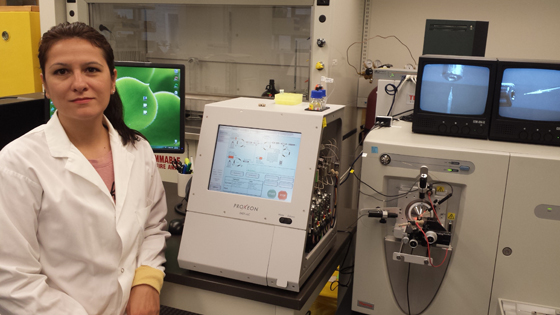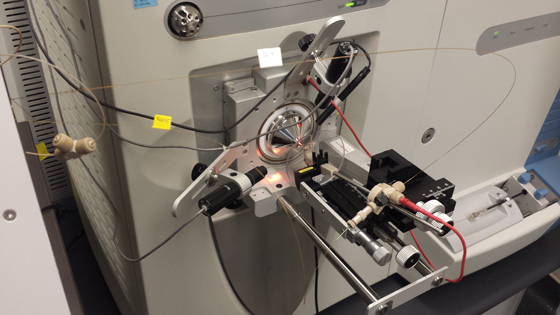
Dr. Andrea Bozovic and a mass spectrometer used for amyloid testing (Photo: UHN)
UHN's Laboratory Medicine Program is the first lab in Canada to offer amyloidosis subtyping – a test to identify the specific type of amyloid that has been deposited, so that treatment can be tailored to the patient.
The laboratory test
Amyloidosis is a group of diseases in which one or more organ systems in the body accumulate deposits of abnormal proteins called amyloids.
The patient's symptoms may vary depending on where in the body the amyloid deposits have accumulated, though amyloidosis frequently affects the vital organs: heart, kidneys, liver, spleen, nervous system and gastrointestinal tract.
One form of amyloid can be a life threatening complication associated with some cancers, most significantly multiple myeloma.
Symptoms: Progressive and severe
The symptoms associated with this disease are progressive and severe – for example: if amyloid has built up in the heart and led to heart disease, the patient may experience heart failure or severe arrhythmia. If amyloid has built up in other organs it can lead to an enlargement of the spleen or inflammation of the gastrointestinal tract that can lead to vomiting, hemorrhaging, and diarrhea – and the patient may need an organ transplant.
"Management of amyloidosis relies on the treatment of the underlying cause of the disease and differs radically for the different type of amyloid," says Dr. Vathany Kulasingam, biochemist, Laboratory Medicine Program (LMP). "A clear diagnosis and subtype characterization is essential."
"But when patients initially present with these symptoms – such as arrhythmia or vomiting, there could be a multitude of reasons as to why they have these symptoms," says Dr. Rohan John, pathologist, LMP. "We need to know whether or not the patient has amyloidosis because they are very sick and can't wait for an answer."
"We recognized this as an opportunity to improve how we deliver care to our patients. So, a decision was made to bring the test in house in order to provide faster, better care to our patients," adds Dr. John.
The benefits of amyloid testing
Referring amyloid testing to out-of-country laboratories has resulted in lengthy turnaround times, high cost and unnecessary delays in treatment for patients.
"Having the test result quickly is critical because the treatment needs to be initiated in a timely fashion. Delays in testing would delay treatment, which is absolutely unacceptable," explains Dr. Jagdish Butany, pathologist, LMP.
"Sending our samples out of the country for testing just wasn't cutting it," he adds. "Our patients need answers faster and we knew we had to step up and deliver."

Close-up of the mass spectrometer. (Photo: UHN)
Technical and clinical expertise in LMP
Called 'shot-gun proteomics,' this test requires a section of tissue to be biopsied and mounted onto a specific slide and stained. Laser capture microdissection is performed, proteins extracted and put into a highly specialized piece of lab equipment, called a mass spectrometer. It's a very complex test that requires a lot of data interpretation. It's far from routine which is likely why no other lab in Canada offers it.
"To date, over 30 types of 'amyloidogenic' proteins have been identified, but developing a traditional test for each one is labour-intensive and not feasible with the amount of tissue available per patient," explains Dr. Kulasingam.
"With a single slide, we are now able to characterize not only the 30 types of amyloidogenic proteins, but also have the capability to identify new proteins for this disease."
Leadership and support
"Very few clinical diagnostic laboratories are using mass spectrometry for protein identification, largely due to technical hurdles. We worked with the Amyloid Support Group, Princess Margaret Cancer Foundation and our laboratory department to fund the purchase of the instrument for this specific clinical need," adds Dr. Kulasingam.
"LMP has taken a leadership position with amyloid testing and we're proud to become a national resource for this type of testing. We offer amyloid testing to our patients and our partners, as well as any other hospital that wants this highly specialized diagnosis for their patients," says Dr. Runjan Chetty, Interim Medical Director, LMP.
"We're committed to serving as global leaders in lab medicine and putting in the work, effort and resources in order to provide amyloid testing in-house is just another way we are committed to fulfilling that mission."
